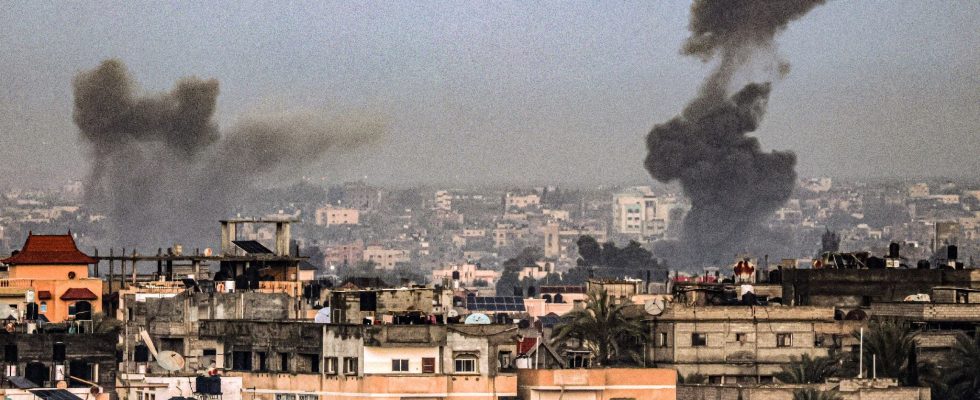The exchanges of fire continue, while Hamas leader Ismaïl Haniyeh is expected in Egypt to discuss a proposal for a humanitarian pause and the release of hostages.
In western Iraq, American strikes targeted pro-Iran armed groups this Friday. Washington had pledged to carry out retaliation after the drone attack which killed three soldiers at the end of January on a base in Jordan, near the border with Syria.
Information to remember
⇒ American strikes target pro-Iran armed groups in Iraq and Syria
⇒ New Houthi missile attacks targeted Israel
⇒ CMA-CGM once again suspends the transit of its ships through the Red Sea
Intense Israeli strikes in Rafah
This Saturday, February 3, the city of Rafah, where more than a million Palestinians threatened by the war in Gaza have taken refuge, is the scene of intense Israeli strikes. The Hamas Health Ministry announced the deaths of at least 100 civilians in the evening and night, in strikes on two residences in this town bordering Egypt, at the southern tip of the Gaza Strip.
Towards a humanitarian pause? Hamas leader expected in Egypt
The leader of Hamas, Ismaïl Haniyeh, based in Qatar, is expected in Egypt to discuss a proposal drawn up during a meeting at the end of January in Paris between the head of the CIA, William Burns, and Egyptian, Israeli and Qatari officials . According to a Hamas source, the proposal involves three phases, the first of which provides for a six-week truce during which Israel will have to release 200 to 300 Palestinian prisoners in exchange for 35 to 40 hostages held in Gaza, and 200 to 300 trucks of aid will be able to enter the territory every day.
On Thursday, February 1, Hamas gave a “first positive confirmation” to this proposal for a humanitarian pause in Gaza, just like Israel, according to the spokesperson for Qatari diplomacy, Majed al-Ansari. During his fifth tour of the Middle East, which begins on Sunday February 4, US Secretary of State Antony Blinken promised to push for the release of hostages, in exchange for a pause in the Israeli offensive in Gaza, the State Department said this Friday.
American strikes in Iraq and Syria
According to two Iraqi security sources, American airstrikes targeted positions of pro-Iran armed groups in western Iraq during the night from Friday to Saturday, particularly in the Al-Qaïm sector on the border with the Neighboring Syria. A second strike, in the Al-Akachat region, further south and still close to the border, targeted a command center for the operations of Hachd al-Chaabi, a coalition of former paramilitaries bringing together these pro-Iran factions.
The US Middle East Military Command (Centcom) confirmed that it had carried out “airstrikes in Iraq and Syria”, claiming to have targeted pro-Iran groups and personnel from the Quds Force, the foreign operations branch of the Guardians of the Iranian revolution. Washington had committed to carrying out these retaliatory strikes after the drone attack which killed three soldiers at the end of January on a base in the middle of the Jordanian desert near the border with Syria.
New Houthi missile attacks against Israel
Houthi rebels in Yemen claimed responsibility for new missile attacks against Israel this Friday. For its part, the Israeli army claimed that its air defense system had intercepted “a surface-to-surface missile which was approaching Israeli territory in the Red Sea area”.
The Iran-backed Houthis added in their statement that they “will not hesitate to carry out further military operations against the Zionist enemy on land and at sea until the cessation of aggression against the Gaza Strip and the lifting of the blockade” imposed on this territory by Israel.
CMA-CGM once again suspends the transit of its ships through the Red Sea
The French maritime carrier CMA-CGM decided this Friday to suspend “until further notice” the transit of its ships through the Red Sea, where many boats have been targeted by attacks by Houthi rebels. Like other shipowners, CMA CGM interrupted transit through the Red Sea on December 16, before resuming it on December 27. But unlike others, the company continued throughout the month of January despite several attacks in the area.
According to the IMF, maritime container transport through the Red Sea fell by almost 30% year-on-year. Before the conflict, between 12 and 15% of global traffic passed through this axis, according to the EU. From now on, a large part of maritime traffic between South Asia and Europe avoids the Suez Canal and goes around Africa via the Cape of Good Hope, which extends the journey by around two weeks.
